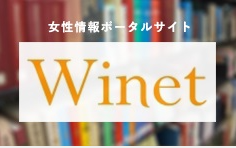International Cooperation
- HOME
- International Cooperation
- NWEC Global Seminar
- FY2008 International Forum for Women's Empowerment Final Report2
NWEC Global Seminar
- Event Report
-
FY2008 International Forum for Women's Empowerment Final Report2
Date:
Break: Poster Session and Exhibits
During 2 days International Forum, Poster Session on “Violence against Women” was held at the Hall of Auditorium Building of NWEC. Education materials and posters exhibited were brought from the participants of 2008 Asia Pacific Women Leaders Empowerment Seminar which was held on November 2008.
As well as posters, many participants watched education panels on human trafficking which was produced as a part of NWEC Human Trafficking Research Project in 2007.
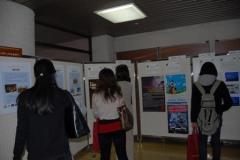 People Watching Posters
People Watching Posters
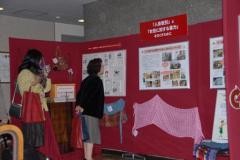
Fair trade exhibits opened during break, forum participants enjoy coffee and cookies produced in the developing countries and strengthen the network with each other.
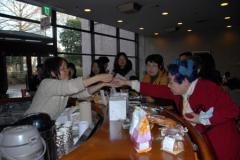 Fair Trade Exibits
Fair Trade Exibits
Session Meetings
After the break, 3 session meetings each began with the presentation by the experts current situation and the latest measures taken in different countries. Based on these reports, active discussion were held among the experts, foreign-citizenship women living in japan, women’s center staffs and those involved in education.
Session Meeting I Issue of Rescue and Protection
Discuss necessary measures to deploy immediate and safe access to rescue, reaching out to all the potential victims of trafficking.
Discussion of Session Meeting I, facilitated by Ms. Yoko Yoshida, Lawyer and Co-chair of JNATIP, was vigorously done on whether victims can be protected or not, the service provided is proper or not, based on the report from Government, International Organizations and NGOs on the current situation of TIP victim.
One of the most difficult challenges was the obstacles to access rescue and protection services. Various efforts in foreign countries such as setting up hotline, putting leaflets or stickers in the necessary places were introduced.
However, those attending the meeting pointed out the complicated method of trafficking made it harder to define TIP victims and the needs for the personnel in charge of identifying victims who have the knowledge of rescue and protection.
It was underlined that the important point in eradicating TIP is to rescue and protect all the potential victims including those in the “grey zone”.
Besides these, importance of providing protectional services with understanding for victims’ cultural backgrounds including languages because of the miscommunication problems in shelters was pointed out.
List of Experts
- Protection of TIP Victims in Japan
Mr. Takayuki Sakai, Specialist for Protection of Women,
Office of Fatherless Family Assistance, Needy Family Welfare Division, Equal Employment, Children and Families Bureau, Ministry of Health, Labour, and Welfare
- Current issues in Rescue and Protection
Ms. Naoko Hashimoto, Program Coordinator, IOM
- Local Government Support ,Case of Chiba Prefecture
Ms. Tomiko Takashina, Senior Officer,
Chiba Prefectural Support Center for Women,
- Support Activity for TIP Victims in Japan
Ms. Keiko Ohtsu, Former Director, House in Emergency of Love and Peace
(HELP), Co-chair, JNATIP
- Support Activity for Migrant Women in Japan
Ms. Virgie Ishihara, Director, Filipino Migrant Center (FMC)
- Support for TIP Victims in the United States
Ms. Yuriko Hara, Director General, International Movement Against All Forms of Discrimination and Racism Japan Committee (IMADR-JC)
Steering Committee member, JNATIP
Ms. Vittoria Luda di Cortemiglia, Focal Point on Human Trafficking and
Program Coordinator, Counter Human Trafficking and Emerging Crimes Unit, UNICRI
Facilitator: Ms. Yoko Yoshida, Lawyer, Co-chair, JNATIP
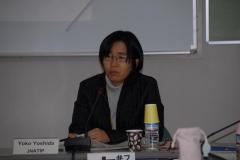 Ms. Yoko Yoshida, Facilitator, Mr.Sakai and Ms.Hashimoto
Ms. Yoko Yoshida, Facilitator, Mr.Sakai and Ms.Hashimoto
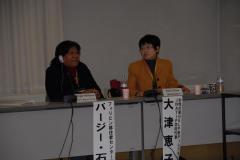 Ms.Virgie Ishihara, Ms.Ohtsu and Ms.Cortemiglia
Ms.Virgie Ishihara, Ms.Ohtsu and Ms.Cortemiglia
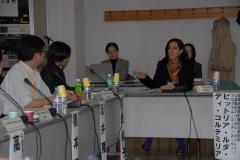
Session Meeting II Rehabilitation and Empowerment
Discuss measures necessary to realize long-term recovery from the damages of violence, self-supporting life and recovery, and children and other issues.
In Session Meeting II, facilitated by Prof. Hiroko Hashimoto, from the Jumonji University, panelists from Thai Government, NGOs from the Philippines, Thailand and Japan and shelter in Japan reported their activities. SEPOM in Thailand and DAWN in the Philippines are the organizations cooperating with the research by NWEC.
Based on these reports, discussion focused on the methods and challenges for victims and their children to recover mentally and economically.
It was strongly emphasized that the importance of providing support from victim’s perspective and strengthening network among NGOs, International Organizations, Central and Local Governments and the experts on the issue. Needs of conducting appropriate survey and research to make policies reaching the victims was also raised.
Report of Thai-Japanese Children (TJC) and Japanese Filipino Children (JFC) showed the difficulties of providing support to these victims and children. For example, TJC who had initial education in Japan faced adjustment problem after returning Thailand; On the other hand , there were cases of JFC who was able to meet their Japanese father and received financial support to go on to college.
In order to support their children and families, some TIP victims have to return to Japan to work again. They suffer deep mental damage and it is difficult to provide them support.
It was pointed out that long-term support by the government is very difficult because public services are provided on limited term basis.
Remaining challenges includes how to facilitate communities and families to accept TIP victims, how to strengthen international network among central and local governments, NGOs, International Organizations and individual experts including the media to play an important role in giving a true picture of trafficking.
Finally, a proposal was made that establishing new network including media was necessary to eradicate the human trafficking.
List of Experts ( *presentation) :
- Empowerment Activities of Women’ NGOs in Thailand
Ms. Ladda Kangwannavakul, Education Technical Officer, Informal Education section, Chiang Rai City Municipal Office
Committee member of Self Empowerment Program of Migrant Women (SEPOM)
Ms. Mari Nyota, Former Director General, SEPOM
- Partnership for Effective Support Activity
Prof. Mitsuko Horiuchi, Professor, Bunkyo Gakuin University Graduate School
Director, Child Labour Network
- Support Activity for Japanese Filipino Children and Mothers
Ms. Carmelita Gopez Nuqui, President and Executive Director, DAWN
- Support Activity by Shelter in Japan
Ms. Noriko Toriumi, Social Worker, Friendship Asia House (FAH) Cosmos
Ms.Yanee Lertkrai, Director, Bureau of Anti-Trafficking in Women and Children, Ministry of Social Development and Human Security
Prof. Yuriko Saito, Assistant Professor, Keisen University,
Steering Committee Member, JNATIP
Facilitator: Prof. Hiroko Hashimoto, Professor, Jumonji University
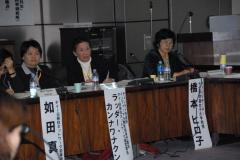 Prof.Hashimoto, Cordinator
Prof.Hashimoto, Cordinator
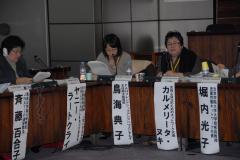 Various Efforts in Asian coutries were reported
Various Efforts in Asian coutries were reported
Session Meeting III STOP on DEMAND: Prevention, Education and Awareness Raising
Will look at current best practices of preventive education・awareness raising measures to stop the issue of “demand”.
List of Experts
*Demand Reduction Approach and its Difficulties
Dr. Kimio Ito, Professor, Graduate School of Letters, Kyoto University
*Activity in University
Prof. Nami Ohtsuki, Associate Professor, University of the Sacred Heart Tokyo
*Involvement of Youth
Ms. Shihoko Fujiwara, Director, Polaris Japan
*Anti-trafficking Activity of Women’s Center
Ms. Teruko Ohno, President, Japan Association for Women’s Education
*Demand in the Philippines and Importance of Education
Dr. Maria Rosario Ballescas, Professor, Social Sciences Division,
Visayas Cebu College, University of the Philippines
*Support and Outreach Activity by Migrant Social Worker in Japan
Mr. Frank Ocampos, Counselor, Child and Family Support Center, Family Center Viola
Facilitator: Miho Watanabe, Researcher, NWEC
International Cooperation
- International Seminar
- FY2019 Seminar for Gender Equality Officers and Women Leaders in the Asia Region
- FY2018 Seminar for Gender Equality Officers and Women Leaders in the Asia Region
- FY2017 Seminar for Gender Equality Officers and Women Leaders in the Asia Region
- FY2016 Seminar for Gender Equality Officers and Women Leaders in the Asia Region
- FY2015 Seminar for Gender Equality Officers and Women Leaders in the Asia Pacific Region
- FY2014 Seminar for Gender Equality Officers and Women Leaders in the Asia Pacific Region
- FY2013 Seminar for Gender Equality Officers and Women Leaders in the Asia Pacific Region
- FY2012 Seminar for Gender Equality Officers and Women Leaders in the Asia Pacific Region
- FY2011 Seminar for Gender Equality Officer and Women Leaders in the Asia Pacific Region
- FY2010 Empowerment Seminar for Women Leaders in the Asia Pacific Region
- FY2009 Empowerment Seminar for Women Leaders in the Asia Pacific Region Final Report
- FY2008 Empowerment Seminar for Women Leaders in the Asia Pacific Region
- FY2007 Empowerment Seminar for Women Leaders in the Asia Pacific Region
- FY2006 Empowerment Seminar for Women Leaders in the Asia Pacific Region
- NWEC Global Seminar
- FY2025 NWEC Global Seminar: Addressing Technology-Facilitated Gender Based Violence (TFGBV): Approaches to Eradicate the Invisible Harm
- FY2024 NWEC Global Seminar: Gender Equality and Care
- FY2023 NWEC Global Seminar: Gender Mainstreaming & Strengthening Institutional Mechanism with Gender Perspective
- FY2022 NWEC Global Seminar: Does Digital Technology Advance Gender Equality?
- FY2021 NWEC Global Seminar: Combating Gender-Based Violence – “Building Back Better” from the Covid-19 Crisis
- FY2020 NWEC Global Seminar: Covid-19 and Gender
- FY2019 NWEC Global Seminar: Gender and Media
- FY2018 NWEC Global Seminar: Promotion of the Advancement of Women - What Japan can learn from Iceland about Gender Equality?
- FY2017 NWEC Global Seminar: Promotion for Advancement of Women Lessons from Germany
- FY2016 NWEC Global Seminar: Promotion for Advancement of Women –Lessons from Europe
- FY2015 International Symposium: Gender Equality and Women's Empowerment
- FY2014 International Symposium: Keys to Diversity and Women's Leadership
- FY2013 NWEC International Symposium:Gender Equality for Men
- FY2012 NWEC International Symposium:To Make a Society without Violence against Women a Reality
- FY2011 NWEC International Symposium
- FY2010 International Forum for Women's Empowerment
- FY2009 International Forum for Women's Empowerment
- FY2008 International Forum for Women's Empowerment Final Report3
- FY2008 International Forum for Women's Empowerment Final Report2
- FY2008 International Forum for Women's Empowerment Final Report1
- Cooperation with JICA
- FY2025 Knowledge Co-Creation Program (KCCP): "Promotion of Global Networking on Anti-Trafficking in Persons"
- FY2025 Knowledge Co-Creation Program "Eradicating Sexual and Gender-Based Violence (SGBV)"
- FY2025 Knowledge Co-Creation Program: Bangladesh “Strengthening Capacity to Address Gender-Based Violence"
- FY2024 Knowledge Co-Creation Program on "Promotion of Global Networking on Anti-Trafficking in Persons"
- FY2024 Knowledge Co-Creation Program "Eradicating Sexual and Gender-Based Violence (SGBV)"
- FY2023 Knowledge Co-creation Program "Promotion of Networking among ASEAN Countries on Anti-Trafficking in Persons”
- FY2023 Knowledge Co-Creation Program "Eradicating Sexual and Gender-Based Violence (SGBV)"
- FY2022 Knowledge Co-creation Program "Promotion of Networking among ASEAN Countries on Anti-Trafficking in Persons”
- FY2022 Knowledge Co-Creation Program "Eradicating Sexual and Gender-Based Violence (SGBV)"
- FY2021 Knowledge Co-creation Program "Promotion of Networking among ASEAN Countries on Anti-Trafficking in Persons”
- FY2020 Knowledge Co-creation Program "Promotion of Networking among ASEAN Countries on Anti-Trafficking in Persons”
- FY2019 Knowledge Co-creation Program "Promotion of Networking among ASEAN Countries on Anti-Trafficking in Persons”
- FY2018 Knowledge Co-creation Program "Promotion of Networking among ASEAN Countries on Anti-Trafficking in Persons”
- Issue-specific Training “Seminar on Promotiom of Networking among ASEAN Countries on Anti-Trafficking in Persons”
- Basic Information-Gathering Survey/Workshop Seminar on the Economic Independence for Women in Central America and the Caribbean (El Salvador/Dominican Republic)
- Regional Gender Seminar in Central and South America
- 2015 Issue-specific Training "Seminar on Promotion of Networking among Asian Countries on Anti-Trafficking in Persons"
- Seminar on the Promotion of Education for Girls and Women II
- International Conference/International Exchange
- Visit by Professor Hilado from the University of the Philippines Visayas
- Online meeting with Seisen International School elementary students
- Visitor: Mansfield Fellows
- Visitor:JICA Knowledge Co-Creation Program (KCCP) on "Women's Empowerment through Business for Central American Integration System (SICA) Member Countries"
- The 68th Session of the Commission on the Status of Women
- Visitor: Madam Sustjie Mbumba, First Lady of the Republic of Namibia
- Workshop of commemorating the donation of the Beate Shirota Gordon archive materials
- Meeting with Korean Women’s Development Institute (KWDI)
- The Coalition of Finnish Women's Associations (NYTKIS) Secretary General Ms. KAKKOLA’s Courtesy Call to Foreign Minister KAMIKAWA
- The Coalition of Finnish Women's Associations (NYTKIS) Secretary General Ms. KAKKOLA’s Japan Visit Program
- The 67th Session of the Commission on the Status of Women
- NGO CSW67 Forum
- Webinar with Korean Women’s Development Institute (KWDI)
- The 66th Session of the Commission on the Status of Women (Hybrid format)
- Online meeting with international graduate students from the Appropriate Technology course at the University of Tsukuba
- The 65th session of the Commission on the Status of Women
- Lecture "The Beate Sirota Gordon Archives at Mills College"
- Participation in 2nd AGenT
- The 64th session of the Commission on the Status of Women
- Dr. Wang from National Taiwan University visits NWEC
- Japan Network of Women Engineers and Scientists and The Japan Inter-Society Liaison Association Committee for Promoting Equal Participation of Men and Women in Science and Engineering: 9th Japan Korea China Women Leaders Forum for Science & Technology
- Researcher from the KWDI visits NWEC
- Visit by a delegation from the Socialist Republic of Vietnam Ministry of National Defense
- Briefing on the Reykjavik Index for Leadership
- Women's Archives Center Exhibition "Beate Sirota Gordon and gender equality in Japanese Constitution"
- Visit from the Guangxi Women’s Federation
- Participation in the 63rd Session of the Commission on the Status of Women
- 7th Global Forum on Gender Statistics
- FY2018 International Symposium hosted by Korean Institute for Gender Equality Promotion and Education “Gender Equality at Schools”
- Visit from All-China Women’s Federation(ACWF)
- Participation in the 62nd Session of the Commission on the Status of Women
- The 14th KIGEPE International Symposium “Empowering Women’s Leadership: expanding influence and innovation”
- Participation in the 61st Session of the Commission on the Status of Women
- Visit from the Batis Center for Women
- 2011 Asia Women Eco-Science Forum (a forum of science and engineering leaders in Japan, China and Korea)
- The 60th Session of the Commission on the Status of Women
- The 59th Session of the United Nations Commission on the Status of Women
- The 58th Commission on the Status of Women
- The 57th Session of the United Nations Commission on the Status of Women
- International Symposium: Gender Awareness Education for Sustainable Development
- Thirtieth Anniversary Programs
- Attendance at the Ceremony Commemorating the 25th Anniversary of the Korean Women’s Development Institute (KWDI)
- Japanese-Filipino children (JFC)* from the Philippines-based NGO “DAWN” visit the Center
- Visitors from Abroad to NWEC
- Research report on Multicultural Family Support in South Korea
- Workshop on Gender and Education: Life-long Learning for Women’s Empowerment
- Lecture Delivered by a Visiting Researcher
- Connections: Bringing Together the Next Generation of Women Leaders in Science, Technology, Engineering and Mathematics
- Conclusion of Memorandum of Understanding on Exchange and Cooperation with the Ministry of Women's Affairs, Royal Government of Cambodia
- Visit to Japan by the Minister of Women’s Affairs of the Royal Government of Cambodia
- KIGEPE Delegation Visit
- Officials of Ministry of Information and Communications of the Socialist Republic of Vietnam visited NWEC
- The 56th Commission on the Status of Women
- Dr. Barker's visit
- Multidisciplinary Intellectual Exchange for Women Leaders from the United States, Japan, South Korea and the Philippines
- Courtesy visit to University of Hawai`i
- Delegation of Board for the Advancement of Women, Ministry of Finance of the Socialist Republic of Vietnam visited NWEC
- Visit Korean Women's Development Institute (KWDI)
- Report on Participation in the 5th World Social Forum on Migration
- A group led by the Vice President of the Korean Women's Development Institute visited NWEC
- A disaster management specialist from India visits the Center
- Visit to the Korean Institute for Gender Equality Promotion & Education (KIGEPE) and others
- Secretary of State, Ministry of Justice, Kingdom of Cambodia visited NWEC
- Research conducted in the Republic of the Philippines
- Research on the Comparative Study of the Gender Equality Policy in Southeast Asian Countries in the Kingdom of Cambodia
- Ochanomizu University and A Canadian Women’s Study Researcher visited NWEC
- Aigyung Yang, Research Fellow and Former Director of Strategy Board for Women Friendly Policies of the Korean Women's Development Institute (KWDI) Visits NWEC
- Delegation of the Ministry of Defense of the Socialist Republic of Vietnam visited NWEC
- Delegation from the Women and Development Center, of the Vietnam Women's Union, Visited NWEC
- The "7th Asia-Pacific Forum on Development and Gender" was held in Seoul, South Korea
- HOME
- International Cooperation
- NWEC Global Seminar
- NWEC Global Seminar
- FY2008 International Forum for Women's Empowerment Final Report2

